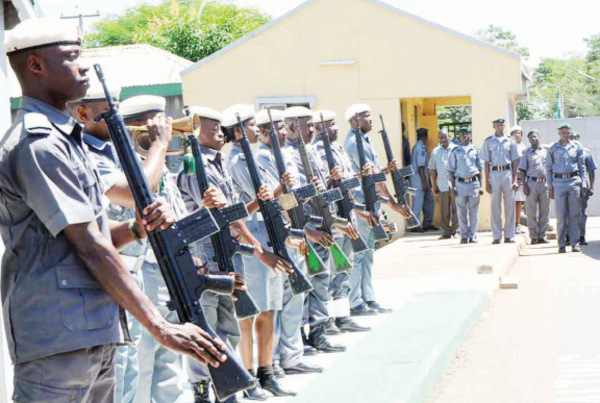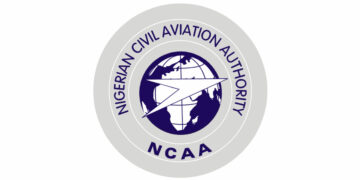Importers and clearing agents operating at the nation’s seaports have raised the alarm over anti-trade policies introduced by the Nigeria Customs Service (NCS) in its bid to meet its ambitious N3.1 trillion revenue target for 2022.
LEADERSHIP gathered that the anti-trade policies include multiple trade alerts on already cleared cargoes, multiple interventionist units such AS Customs Police, CG Adhoc Team, etc., which are frustrating cargo clearance and leading to diversion of cargoes to neighbouring countries by importers.
Speaking to LEADERSHIP, the acting president, Association of Nigerian Licensed Customs Agents (ANLCA), Dr Kayode Farinto, disclosed that multiple alerts had increased cargo diversion to neighbouring countries by 30 per cent.
According to him, the alert systems and multiple intervention units were created by the Customs management to attain the N3.1trillion revenue target shared among various units by the service.
He, however, noted that President Muhammadu Buhari should overhaul the current Customs management due to its anti-trade policies that are fueling cargo diversion to neighbouring countries.
He said, “Customs alerts on already cleared cargoes have gone up lately because they want to meet the 2022 target. They are contributing to cargo diversion to neighboring countries.
“The present management lacks ideas on trade facilitation, they have overstayed their welcome; therefore, we want government to appoint a career officer who knows about trade facilitation because these anti-trade policies are fueling diversion by 30 per cent.”
On his part, the national public relations officer of the Association of Registered Freight Forwarders (AREFFN), Mr Taiwo Fatomilola, alleged that multiple units from Customs send alerts on already examined cargoes.
Fatomilola who noted that unlike the Nigeria Police Force (NPF), which collapsed its different segments into one unit, the Customs operates under different nomenclature.
He said, “the Customs are not authentic and most of the things they are saying are not practical. They have the examination report they write, but they will still bring FOU, Strike Force and Customs Police. Is this not a duplication of duty?
“We have the different types of police units, all at the port, such as the CID, Monitoring Unit and the like, but they are combined together under one umbrella, operating as one unit. But Customs has different units in the same port. At the point of Examination, the CIU, Release Officer, Valuation and Enforcement units must be there because if you don’t invite them, they will alert on you.”
The public relations officer of the African Association of Professional Freight Forwarders of Nigeria (APFFLON), Tin Can Island Port Complex, Clinton Okoro, also decried the multiplicity of Customs’ intervention units in and out of the port.
He added that their activities greatly hamper trade facilitation and free movement of already cleared cargo out of the ports.
“In my understanding, the Customs Police, FOU and Strike Force should not have anything to do with already examined and cleared cargoes. This is because they have resident officers, but the whole thing boils down to the fact that these are distractions. Talking about trade facilitation, all these units are just distorting free movement of cargo.
“No matter how compliant you are, immediately the cargo leaves the port you are going to face these intervention units. Customs Police operate at night, yet they don’t have a checkpoint. At night, they roam and each container they see, they stop it. There is nothing like intelligence.
“Every night, we see Customs Police around Ijora Bridge, and immediately after Area B’ Police station in Apapa, you would see FOU and Strike Force stopping containers. To me, these are just duplications of duties. You have the CIU who have done all the checks, the resident officers have done their part and the releasing officer has released the container and it has gone through the gate. If there is anything wrong with the documentation, the system should detect it.
“Why stop cargoes that have already exited the port? Sometimes, a junior Customs officer will stop a container that a deputy comptroller released from exiting the seaport.
If you say you have intelligence on a container that has exited the port, then what about the person who released the job? These are the questions we are asking,” Okoro said.
When contacted, the public relations officer (PRO), Nigeria Customs Service (NCS), Timi Bomodi, said there are no multiple alerts.
“All alerts come from systems audit and its purpose is to guide the officers on the field as to certain items whose import/export pose different levels of risk. This system has helped to block revenue leakages; it has helped to check the inflow of dangerous pharmaceuticals and other illicit items. The only people who oppose this system are persons with questionable intentions. Compliant traders have their consignments cleared from the port speedily. Those diverting cargo have skeletons in their cupboards and they know fully well that the long arms of NCS will get them either now or in future.”





